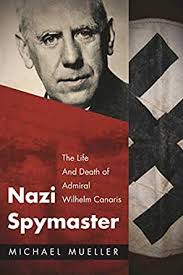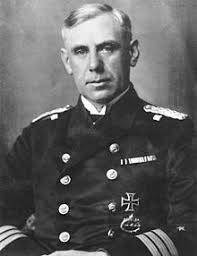GoodReads meta-data is 368 pages, rated 3.37 by fifteen litizens.
Genre: biography.
Verdict: [See Edmund Burke]

Wilhelm Canaris (1887-1945) was head of the central intelligence service, the Abwehr, in Nazi Germany from January 1935 to December 1944, appointed by Adolf Hitler. He went into the Imperial German Navy in 1912 and during the Great War served on a U-Boat, based at Pola on the Adriatic Coast of Austria, and we were there a couple of years ago on the way to Venice, sailing in South American waters during World War I. Fluent in Spanish, while doing so, he set up coast watching networks that observed Allied shipping movements. This was the beginning of his career as a spy.
His boat was interned with engine failure in Chile, and he made his own way back to Germany by stealth. Another credit in his spy book. He passed himself off as an Argentine when travelling through Bristol while the war was still on and went on to the neutral Netherlands and from there to Kiel.
The 1918 armistice took most German seamen by surprise, having had a steady diet of propaganda, they expected the British to capitulate at any moment, and had little idea how dire the military situation was, and even less knowledge of the privations on the home front. They were either isolated at sequestered naval bases far from the front and cosseted from the privations of citizens, or in ships far away at sea.
In the disorder of 1918-1920 that followed the armistice he took the side of order, as he understood it, and helped organise Freikorps resistance to the Spartacus Revolt. There is no doubt he feared a Red Revolution like that in Russia and he did everything he could to thwart such an occurrence in Germany, though how much he would have known about the Red Terror at the time is unclear to this reader.
These were confused and confusing times. He spend much of the 1920’s on missions to Spain as the Weimar Republic tried to circumvent the Treaty of Versailles restrictions on ship building with Iberian complicity. In so doing, he built up a network of agents and contacts that would came to serve other purposes.
When his name kept cropping up in League of Nations inquiries into Versailles compliance, the Navy hid him on one of the ageing battleships it had been allowed to retain, which he commanded for three years. His reputation as a mastermind of intelligence and his demonstrated ability as a commander brought him back to Berlin at a time when the intelligence services were being re-organised and were free(r) from conditions in the Versailles Treaty.

While centralisation was opposed by the many independent intelligence services, the compromise was to put a Navy, rather than an Army, man on top, and that was Canaris just as the Nazis completed the seizure of power, which inevitably led to another re-organisation with the SS, the SD, the SA, and the Gestapo dividing up the great game. Somehow Canaris steered through these sharks to keep the Abwehr independent and focussed externally on military matters. To do so he maintained good relations with Rudolph Heydrich, Heinrich Himmler, and the other Nazi cannibals. He must have joined the Party but I cannot remember right now. Through the 1930s he was drawn ever more tightly into the regime, and promoted to fleet admiral.
Along with many others in the armed forces as Hitler’s determination for war developed, Canaris wrote history memoranda. History memoranda are written and filed so that the author can say later, ‘I told you so!’ But without making any great effort to act on the conclusions. For an example see the career of Robert McNamra. This author takes those memoranda at face value, but this reader sees cynicism in many of them, including those by Canaris. He, like many generals, wanted to slow the rush to war, the better for Germany to be prepared. Later he was revolted by the exterminations that swiftly followed in Poland, but soon concluded there was nothing he could do about them.
The endless back-biting, power plays, undermining, arrogance, and selfish self-promotion among the Nazi leadership is impressive. It seems incessant with every kind of calumny employed. Of course, such goal displacement is common in any organisation, however, in this instance it is such a difference of degree to be a difference of kind. Lies, distortions, half-truths, malicious rumours are all the currency of promotion to the point of killing rivals, all the while putting everything in writing. Canaris was a master of this game, though he himself seldom wrote down anything, but he was such a big target that he attracted a host of enemies who compiled dossiers on his every move and utterance. No fool, he must have known that. But he always seemed to have a credible response to the repeated accusations.
From 1935 to 1940 there was occasional talk about a coup d’état to replace Hitler, but it was only desultory talk. The author blames the Allies at times for not supporting such clandestine efforts, but any Allied support, no matter how subtle, might equally have galvanised a furious nationalistic response. From go to whoa, Germans were responsible for what Germans did. End of story.
In July 1944 his name was linked to the conspirators who tried to kill Hitler. The fact that no evidence supported such an association was itself taken as proof of how devious he was, and he was arrested, isolated, humiliated, tortured, and executed, as were scores of others who had nothing to do with the plot or plotters. It was convenient for generals and diplomats to blame everything on the Abwehr, which after all had not won the war for Germany. So they did, hoping in vain to save themselves.
The book ends at his execution with no concluding chapter. Too bad. I came to see him as something like Albert Speer, a technician who played all sides of the table. There is no doubt he shielded many enemies of Hitler, and saved some Jews, and did not energetically promote the aggressive war, and discouraged Spain from embracing the Nazi regime, but all this can be seen as investments in alternative futures, and that seems in keeping with a man who had no deep convictions. On the other hand the Abwehr provided a constant stream of valuable tactical and strategic intelligence to the German cause.
While I always found this enigmatic character curious, I have had little taste to read about the terrible times and things in which he was involved. Still I ventured to read the Kindle sample of this biography of Canaris, and morbid curiosity kept me going.
The biggest question for me is why the Germans did not realise that the Enigma Machine had been compromised. It was originally a navy device and Canaris must have had knowledge of it. It is not mentioned in these pages, according to my memory. It is comparable to the German failure to realise in World War I that the British had cracked their most secret code even as the evidence mounted. On this latter instance see Barbara Tuchman, The Zimmerman Telegram, which is discussed elsewhere in this blog. The obvious answer in both cases is arrogance. In WWI the Germans did not believe their complicated cypher could not broken. Period. In WWII the Germans could not believe their complicated cypher machine could be broken. Wrong both times.

